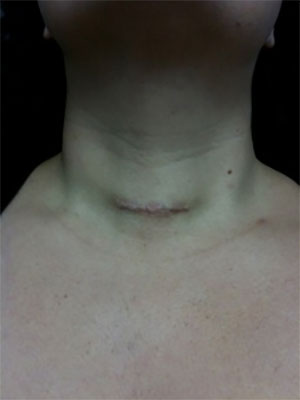 This is a photograph of a patient who is about 10 days post-op following surgery for local recurrence of papillary thyroid cancer. She had a near total thyroidectomy for thyroid cancer about 2 years before in another state. She had an elevated thyroglobulin level and an ultrasound reveal malignant tissue in her right thyroid bed. She had no evidence of distant metastatic disease.
This is a photograph of a patient who is about 10 days post-op following surgery for local recurrence of papillary thyroid cancer. She had a near total thyroidectomy for thyroid cancer about 2 years before in another state. She had an elevated thyroglobulin level and an ultrasound reveal malignant tissue in her right thyroid bed. She had no evidence of distant metastatic disease.
A level 6 node dissection, including accessible level 7 node dissection is recommended. simple removal of the metastatic implant (“berry picking”) is not recommended as the risk of persistent disease is significant.
The operation is performed through the previous operative incision. The lymph nodes and any remaining thyroid tissue are removed on the side of the recurrence and in the mid-line. Great care is taken to identify the parathyroid glands. Frequently, the upper parathyroid gland can be preserved but the lower parathyroid gland is almost always removed, confirmed on biopsy, then re-implanted in adjacent muscle were it re-grows and begins functioning in 6-8 weeks. The goal of surgery is to definitively remove all malignancy in this zone, especially around the recurrent nerve. Persistent disease here can cause significant problems if tumor grows into the nerve or trachea.
Preoperatively, evaluation of the patients vocal cords is performed to document adequate function. As mentioned above, test are performed to exclude distant metastatic disease. A careful review of the previous operative report is helpful as well as a copy of the pathology report. This information helps us judge the risk of re-operative surgery.
The risk of re-operative surgery is elevated compared to initial surgery. The risk of recurrent nerve injury is about 3%. The risk of permanent hypoparathyroidism is less and dependent on the status of the remaining parathyroid glands. With re-implantation, life-style altering need for long term calcium replacement is rare. This surgery is technically demanding and should only be performed by very experienced surgeons.
Recovery after surgery is similar to recovery after a total thyroidectomy. All patients are observed overnight. All patients are discharged on a calcium supplement. RAI ablation is usually considered in 3-6 weeks. With this approach, greater than 70% of patients have their disease controlled.
